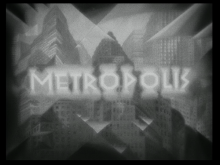
It’s certainly no secret that what’s being called The Complete Metropolis is booked for one show next Friday, Oct. 29 at 7:30 p.m. at The Carolina by the Asheville Film Society. And it probably takes something less than the detecting prowess of Sherlock Holmes to figure out that I was the primary force behind that. Possibly less clear to folks who don’t follow these things is just what “complete” means in this instance—since we’re not talking two or three minutes, but a whopping 25 minute addition—why it’s historically significant and, for that matter, what exactly Metropolis was, what it came to be and what it is again.
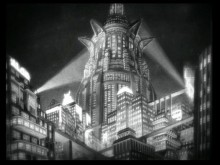
From a personal standpoint, I can barely remember when I didn’t know about Metropolis (1927). Knowing about the film is distinct from having seen it, I should note. The thing is if you were—and I was—a reader of Forrest J Ackerman’s Famous Monsters of Filmland magazine there were certain titles you were going to know regardless of whether or not you were likely to see them, and, for that matter, whether they really “belonged” in a “monster magazine.” This came with the territory because the magazine was in many respects a forum for Ackerman’s personal enthusiasms—including Metropolis, which is in no way a “monster movie,” but which does qualify as “cinema of the fantastic,” thereby excusing its inclusion.
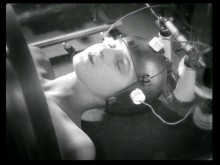
I knew all this—even if I hardly could be said to have digested it—so long ago that I had to ask my father how to pronounce the title and what it meant. (Somehow I did not connect it with Superman’s ersatz New York.) Long before I saw the film, I’d picked up screenwriter (and then Mrs. Lang) Thea von Harbou’s novelization of the movie (which actually came out before the movie) which somehow found its way onto a paperback book rack in a local Rexall store. I’ve always wondered if they ever sold another copy after the one I bought. (I think it’s still around here somewhere, which means it’s outlived the Rexall store.)

Though there were several outfits offering 8mm home copies of Metropolis, I never succumbed to the temptation to buy one—partly because I’d rapidly grown tired of watching silent movies in dead silence before I got around to it. Silent movies had never really been silent, they were meant to be seen with a musical accompaniment. There was another factor I hadn’t understood at the time, and that was projection speed. Most home movie projectors ran at 18 frames per second, but that (or 16 frames per second) was considered “silent” speed—even on projectors that offered different settings for sound and silent. The thing was that the speed hadn’t remained constant over the whole era—by the late 1920s, it had edged up very near to the 24 frames per second of sound film. That probably played a factor—along with the dead silene—in my quick disillusionment with watching silent movies at home.
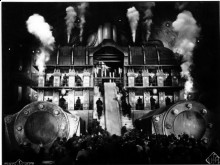
So Metropolis remained a film that known to me strictly from the novelization (which I’d found kind of tough slogging) and from those tantalizing still photographs in the magazines. And those stills were tantalizing—sets the likes of which nothing had duplicated, the amazing robot and a mad scientist laboratory that was everything you could wish for. The images themselves were so strong that they transported you to the world of the film—or the world of the film as you imagined it to be. Often, the reality turned out to be less than the stills suggested when you finally caught up with the film.
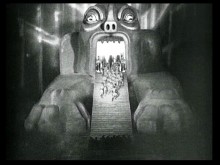
It wasn’t until I was 18 that I finally saw the movie itself—in a packed auditorium at the University of South Florida in Tampa. And wouldn’t you know it—there was no musical score. So a couple hundred college kids watched the film in rapt silence—albeit a silence that was occasionally broken (but surprisingly only very occasionally) by laughter at some of the performances. Someone once noted that the film was acted as if the direction consisted of someone having yelled, “Fire!” at the begining of each take. That’s not entirely inaccurate, since even by silent movie acting styles, some of the performances are on the broad side. But the otherworldly quality of silent pictures tends to overcome this.
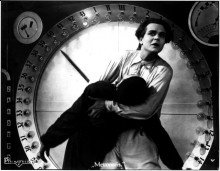
For once, the impact of the film and what the still photos suggested were about on even footing—in most cases the moving images were even better than the photos. And yet something was wrong, and it didn’t have anything to do with watching Metropolis in silence. No, it was something else. The film was more a collection of brilliant scenes than it was a persuasive whole. It was choppy. It was often illogical. Character motivations were shaky or even non-existent. Sometimes it was downright incoherent. Of course, what I didn’t know is that I was seeing a print with something close to an hour cut out of it.
It was about at this time—thanks to the university book store—that I discovered serious movie criticism and history. Most of the books that were generally available back then were simplistic, heavy an nostalgia, short on facts and even shorter on critical acumen. Here, all of a sudden, were books that showed evidence of research and actual thought. Hell, they even used that impressive term “cinema” rather than film or the ulltra-plebian movie. In fact, the two books I read most were John Baxter’s The Cinema of Josef von Sternberg and Paul Jensen’s The Cinema of Fritz Lang. The latter explained how Metropolis had been cut for U.S. consumption—and what followed.
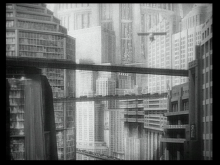
Metropolis was the most expensive silent movie ever made—and it was envisioned as an event as much as a movie. That’s often overlooked because it’s silent, it’s German and it’s long been considered a classic. But in reality Lang was a populist filmmaker with a taste for serials and a penchant for pulp fiction stories. That he also had artistic and socio-political leanings muddied the waters. If you think of him as a more intellectual George Lucas, you mightn’t be too far off the mark. He loved melodrama, attractive leads, super villains and thrills. The deeper aspects of his movies were usually secondary—and occasionally accidental, if it comes to that.

Like the film, a lot of this concept was foreign to Hollywood, which preferred movies on the short side—the occasional spectacle notwithstranding—for the simple reason that this meant more shows per day. (A version of this mindset exists today, albeit in modified form.) Lacking star-power or even—by U.S. standards—a star director, it followed that Metropolis would get a serious trim when it hit our shores. A major plot point—involving the ill-will between the master of Metropolis, Joh Fredersen (Alfred Abel), and mad scientist Rotwang (Rudolf Klein-Rogge)—got lost. The fact that it was over a woman named “Hel,” who chose Fredersen and bore his son, Freder (Gustav Frohlich), made it thought that her name would get a laugh in the U.S. and sealed its fate. The film also got a trim in Germany, since the full version hadn’t been quite the blockbuster Ufa had hoped for—and, at its cost, needed. Somewhere in all this cutting, Lang’s version just disappeared from sight.
Over the years, bits and pieces were restored as various prints of different versions were discovered, finally resulting a version that ran about two hours. It was certainly an improvement—especially since titles were used to bridge the narrative gaps—but it still wasn’t Lang’s version, merely the best approximation possible at the time.
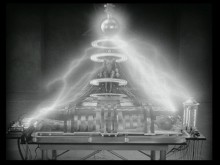
Then in 2008 everything changed in an unbelievable stroke of luck—a 16mm print of the 1927 Berlin premiere version was found in a library in Argentina. It took about two years of restoration work to bring it up to presentable standards so that the missing footage could be put back into the overall film. Perfect? Well, no, that’s hardly possible, since the two hour version was from 35mm and looked as good or better than it did in 1927. The added footage—even cleaned up and restored to the best possible state—is never going to match that, especially since it had to be blown up from 16mm, but it does allow the film to be seen as Fritz Lang intended for the first time in 83 years—complete with the Gottfried Huppertz musical score that had been composed for the film.
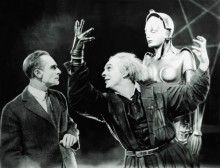
In terms of movies, this is Holy Grail stuff—the kind of beyond-your-wildest-dreams occurence that almost never happens. I’ve seen such notable things as the reappearance of such “lost” movies as Michael Curtiz’s Mystery of the Wax Museum (1933), Russell Mack’s Once in a Lifetime (1932), James Whale’s The Old Dark House (1932), Roland West’s The Bat (1926), T. Hayes Hunter’s The Ghoul (1933) and Ernst Lubitsch’s The Smiling Lieutenant (1931). And while I love all those movies to one degree or another, I don’t think they’re quite in the same league as Metropolis—if only because of the immense influence of the film over the years.
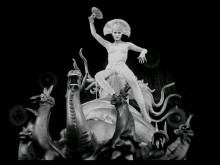
It sounds like an overstatement of outrageous proportion, but Metropolis may be the most influential film ever made. Without thinking about it too hard, I can see it in the design of the laboratory in James Whale’s Frankenstein (1931). The character of Rotwang is not only the basis for nearly every mad scientiest to come down the pike, don’t both the title characters of Dr. No (1962) and Dr. Strangelove (1964) owe their black-gloved appearance to the old boy? Alma Mahler’s (Georgina Hale) hallucinatory strip-tease dance in Ken Russell’s Mahler (1974) clearly recalls images from the robot Maria’s Brigitte Helm “Whore of Babylon” dance from Metropolis. There’s also no denying that C-3PO in George Lucas’ Star Wars (1977) was modeled on the robot of Metropolis.

The design of the dismal 1930 science fiction musical (that sounds more intriguing than it is) Just Imagine is straight out of Metropolis, but more famously there’s Ridley Scott’s Blade Runner (1982), which presents a neo-noir variation of the city of Metropolis. Most recently, the “Revenge of the Giant Face” sequence of Quentin Tarantino’s Inglourious Basterds (2009) deliberately evokes the robot Maria laughing through the flames as the mob burns her “alive.” Virtually every dystopian science fiction film—and for that matter any film that addresses the idea of man being enslaved by the technology that’s supposed to free him—owes a debt to Metropolis.
There are other—less pleasant—associations that can be traced to the film, notably in the Nazi fascination with the film’s vision of the future. It meant nothing sinister in 1927, but the scenes of the youth of Metropolis in their overwhelming stadium engaged in athletic endeavours would come to smack of Hitler youth in their overwhelming—Metropolis-influenced?—stadiums a few years later. It’s tempting to think that Lang was warning of this, but it is likely accidental—or worse. It could as easily be a reflection of Thea von Harbou’s vision, and she became a member of the Nazi party in 1932, the same year Lang beat it out of Germany. I’m frankly hard-pressed to think of another movie this influential—and I didn’t even get into the still modern look of the photography and editing.
But what else is Metropolis? Well, it was always a rattling good pulp melodrama of the kind that can be found in most of Lang’s best work. In its latest 154 minute incarnation, it’s apparently even more of that. I have yet to see it and will likely be seeing it for the very first time as a member of the audience next Friday. From everything I’ve read and everything I’ve been told, it’s also been transforned , or turned back into really a wholly satisfying dramatic experience—and that’s the one thing that has been lacking all these years. I, for one, could not be more excited to see for myself.




Will there be music for its screening at the Carolina?
complete with the Gottfried Huppertz musical score that had been composed for the film
Sorry, somehow I missed that on first reading.
It was a bit of a chore making it through the print I saw in 1972 in dead silence and that was probably about 90 minutes. I cannot imagine asking an auduence to sit through 154 minutes in silence.
I have looked forward to seeing this restored version since it first came to light that the lost footage had been found. Regrettably, I have a prior commitment for this Friday and cannot change plans. I can only hope this is not the one and only time it might be shown locally on a big screen. If so, then surely the restored version will eventually be released on DVD. I hope.
If so, then surely the restored version will eventually be released on DVD.
No need to hope, because it will. But if ever a movie cried out “big screen,” this is it, and I’m sorry you won’t be coming.
“if ever a movie cried out “big screen,” this is it, and I’m sorry you won’t be coming.”
I know; a smaller screen just won’t do it justice, and I really lament missing it, but to weasel out of my commitment at this late date would be rude. If only there was a second, later showing, I would show up in full zombie regalia.
If only there was a second, later showing, I would show up in full zombie regalia.
Damn. I’d almost do that — were it possible — just to see this.
I’m going to need an extra shelf just for my various renditions of Metropolis.
We look through the hourglass of history, but in 1927 the Nazis were not revealed as monsters yet. IMHO Lang can be forgiven any such associations. Unfortunately the Nazis were popular in a lot more places than Germany until well into the 1930s.
You guys in Asheville need to really appreciate Ken’s efforts. The Salt Lake Film Society is comparatively pedestrian. “What’s Metropolis?” “Who’s James Whale?” No time for anything like that. They may call it independent cinema but the film societies seem to show the same stuff wherever you are. Except in Asheville.
I’m going to need an extra shelf just for my various renditions of Metropolis.
This may not end the matter, you know. No word yet on that 9.5mm print’s quality or completeness, and even with restoration work some of this “new” footage looks a little rough — or maybe pretty rough.
We look through the hourglass of history, but in 1927 the Nazis were not revealed as monsters yet. IMHO Lang can be forgiven any such associations.
I don’t think there really are any such associations where Lang is concerned. With Mrs. Lang, who became a gung-ho Nazi after Lang beat it out of Germany, it may be different. But in truth, it is not unlikely that Hitler was influenced in his physical culture mania by this film — which is not to implicate Lang.
You guys in Asheville need to really appreciate Ken’s efforts. The Salt Lake Film Society is comparatively pedestrian. “What’s Metropolis?” “Who’s James Whale?” No time for anything like that. They may call it independent cinema but the film societies seem to show the same stuff wherever you are. Except in Asheville.
Now, that’s the kind of endorsement I like to see, though I suspect there must be some other film societies that do something roughly like ours. The Toronto one does — at least to some degree — though from what I’ve seen it’s more centered on older movies and not as much of a mix.
Well, Metropolis is a thing of the past, but we had a nice turnout — especially for being up against Moogfest and Halloween parties — and I won’t forget the experience of seeing this first on the Big Screen. It’ll be a while before I’ll be able to accept it on a home-sized screen.
Yes, the extra footage — which is, as I’d guessed, very obvious because of the shifts in quality — makes the film a lot more coherent, gives it a much smoother flow and adds both characterization and suspense. I’m afraid, though, that nothing is ever going to make Joh Frederson’s motivations for wanting the workers to riot entirely clear. But in something this rich and this entertaining, I’m just not in the mood to bitch about it very much.
I’d be interested to hear from others who were in the audience tonight. I’d also be interested in hearing any suggestions for further “special event” showings like this. Tommy and Metropolis were easy choices because their restorations and re-issues were in the news. Nothing else is leaping out at me at the moment, but then it’s been a long day and an even longer week.
[b]I’m afraid, though, that nothing is ever going to make Joh Frederson’s motivations for wanting the workers to riot entirely clear.[/b]
I was there and it was the first time I had ever seen the film. I enjoyed it immensely, but this is the moment of the film that really puzzled me. I felt like I had missed something. All in all, it was a great time.
[b]I’d also be interested in hearing any suggestions for further “special event” showings like this[/b]
[i]A Clockwork Orange[/i], please.
A Clockwork Orange, please.
That will certainly be shown at some point, but most likely as a Tue. night Cinema Lounge offering. I’m doubtful it would sell enough tickets to make it practical for an event.
Ken, I want to thank you for bringing Metropolis to Asheville. It was my first silent film and going into it I was a little skeptical that it would hold my attention, but I was captivated. The entire film is a marvel, but the actress who played Maria is something else again. Her ability to convey goodness, sweetness and light contrasting with her evil, “witchy” alter ego was amazing. Who needs words when you can convey emotion like that?
I was also struck by the scence where Rotwang chases her up the stairs out of the catacombs. The depection of her horror at being herded upwards with that relentless light was extremely creepy. I think that would have felt right at home in something much more modern. It was a wonderful experience and I’m so gald that it was on a Friday and I was able to come.
Ken, I want to thank you for bringing Metropolis to Asheville
You are more than welcome. I mean, after all, it was the only way I was going to see it on the big screen.
It was my first silent film and going into it I was a little skeptical that it would hold my attention, but I was captivated.
Silent film can be very daunting — and there’s a lot of if I find kind of tough to get through. Then again, there are a whole of sound films that I have a hard time with. This is, I believe, only the second silent we’ve programmed in any fashion. We did run F.W. Murnau’s Sunrise (1927) a few week’s back for one of the Tuesday night regular screenings. And we are running Murnau’s Nosferatu on Thursday, Nov. 11 for the Thursday Horror Picture Show. I’d like to do more — and I’m sure we will.
The entire film is a marvel, but the actress who played Maria is something else again. Her ability to convey goodness, sweetness and light contrasting with her evil, “witchy” alter ego was amazing. Who needs words when you can convey emotion like that?
If you can accept and appreciate that concept, then there are probably a lot of silent films you’d like. I’m pretty certain that Frank Borzage’s 7th Heaven (1926) and Murnau’s City Girl (1929) are in our future. I’d like to do Fritz Lang’s Spies (1928) and, even though it’s running tomorrow afternoon at 5 p.m. in the Cinema Lounge, Rex Ingram’s The Magician (1926).
I was also struck by the scence where Rotwang chases her up the stairs out of the catacombs. The depection of her horror at being herded upwards with that relentless light was extremely creepy. I think that would have felt right at home in something much more modern.
The acting styles to one side in many cases, I’m constantly surprised by what a very modern filmmaker Lang seems to be.
It was a wonderful experience and I’m so gald that it was on a Friday and I was able to come
I am very happy to hear that someone benefited from the Friday choice. That was why we went with a Friday rather than a Wednesday — and in some cases it turned out that it inconvenienced people. I’m glad to see it actually helped somebody! Are Tuesdays, Wednesdays and Thursdays completely out of the question for you?
“Are Tuesdays, Wednesdays and Thursdays completely out of the question for you?”
Not completely, but childcare is the big issue for me. Friday nights come with free grandparents who don’t mind babysitting, whereas the rest of the week is a different story. So, I appreciated the fact that movie night and child-free night, at least for this week, were one and the same.
And we are running Murnau’s Nosferatu on Thursday, Nov. 11 for the Thursday Horror Picture Show.
I was going to watch that tonight, but I guess I’ll just wait.
To stay on topic, “Metropolis” was pure magic. I was a bit appalled when a friend told me it had no story, if anything, I feel that it is pure story. But he just wanted a counter-point, I believe. I’ve only seen “Metropolis” and “The Woman in the Moon” from Fritz Lang, so I wonder what I should see next for this Hallow’s Eve.
Not completely, but childcare is the big issue for me. Friday nights come with free grandparents who don’t mind babysitting, whereas the rest of the week is a different story. So, I appreciated the fact that movie night and child-free night, at least for this week, were one and the same.
The problem is, of course, that no night is perfect for everyone. Weekends tend to be up against new releases, people with other plans, and the fact that the theater is better able to accomodate us on less busy nights. The weekends are also more difficult for intrepid movie reviewers. But I know the child-care issue is a big one and I’d like to be able to factor it in on occasion at least. This was a moderate success and it was up against Moogfest and Halloween festivities, so we’ll definitely try another Friday when the calendar isn’t so crowded.
To stay on topic, “Metropolis” was pure magic. I was a bit appalled when a friend told me it had no story, if anything, I feel that it is pure story. But he just wanted a counter-point, I believe
A counterpoint to what? I’m less appalled than perplexed by the “no story” claim. I mean there clearly is a story. Was this friend at the screening? Or is this assessment based on one of the earlier truncated versions with the less coherent storyline? Some people have a basic problem with the somewhat untraditional narrative sense that comes with silent film language or utter stylization. (Remember the regular we lost through the combination of Tommy and Sunrise?)
I’ve only seen “Metropolis” and “The Woman in the Moon” from Fritz Lang, so I wonder what I should see next for this Hallow’s Eve.
In terms of Lang or generally? I’m not sure Lang is really suitable for Halloween, though The Testament of Dr. Mabuse is pretty nightmarish, but we’ll run that eventually. Of course, there’s no law against seeing a thing twice, you know. I tend to default to the Universal horrors on Halloween myself.
Was this friend at the screening?
No. I believe he just wanted to hear why I was so psyched about “Metropolis.” I probably should have re-worded what I wrote, as it gives the impression that he said it had no story. It was more like he had heard from others it had no story. Sorry for the confusion there.
It was more like he had heard from others it had no story.
I hope that isn’t meant to make me think more highly of his reasoning.
“I’d also be interested in hearing any suggestions for further “special event” showings like this.”
I’ve always wanted to see ‘Things to Come’ (the original version of the H.G. Wells story) as well as ‘Lost Horizon’ on the big screen.
I’ve always wanted to see ‘Things to Come’ (the original version of the H.G. Wells story) as well as ‘Lost Horizon’ on the big screen
The former appeals because it’s public domain, but that has the downside of whether there’s a copy floating around that’s in good enough shape to project. But I’m back with the same concern I have about A Clockwork Orange — do these titles have enough audience draw to pay for themselves in a theater? For Cinema Lounge screenings, sure, but for a ticketed event?
“do these titles have enough audience draw to pay for themselves in a theater? For Cinema Lounge screenings, sure, but for a ticketed event?”
A salient question for sure; my guess is that the types of films most of your readers would like aren’t the kind that generally would make for healthy box office takes.
As to your first point about the image quality of Things to Come, I am not aware of a decent print. I have it on two labels, and both are just barely watchable. Too bad, because I find it an intriguing film.
A salient question for sure; my guess is that the types of films most of your readers would like aren’t the kind that generally would make for healthy box office takes
It doesn’t need to be all that healthy, merely not anemic. As a result, it needs to be something that somehow stands apart from what we run for free on a weekly basis.
As to your first point about the image quality of Things to Come, I am not aware of a decent print. I have it on two labels, and both are just barely watchable. Too bad, because I find it an intriguing film.
I like the score, but the film has always left me kind of cold. However, it occurs to me that Ken Russell’s TV film on British composers, Ken Russell’s ABC of British Music, had pristine clips from the film. I wonder if there’s a Region 2 BFI disc?
“I wonder if there’s a Region 2 BFI disc?”
No, there isn’t. I looked into it, and found that there IS a ‘digitally remastered’ two-disc special edition release on the Network label. According to reviews, there is restored footage (it shows as 89 minutes long), and the image quality is much improved. However, apparently the sound is, as one UK buyer put it “absolutely abysmal, so bad as to prevent any real enjoyment of the film.”
Oh well.
Yeah, that’s what I found. Not sure I want to shell out $25 just to find out how bad the track is.
I hope that isn’t meant to make me think more highly of his reasoning.
Not at all, just so you know where he was coming from. The conversation was more “So some people say this, so why do you feel that way?” But I was still shocked about an argument being there was no story.
The conversation was more “So some people say this, so why do you feel that way?”
I realize I’m a product of my era — the evil 60s and early 70s — but I simply don’t understand not wanting to find out for one’s self, especially with a title like Metropolis. Tell him it turns out that it’s on TCM this Saturday night. It’ll be a far cry from seeing it in a theater, but he might be able to discern the story or lack thereof.
But I was still shocked about an argument being there was no story
Nah, I’ve read the Rotten Tomatoes comments section and the IMDb message boards. Nothing surprises me anymore.
Rotwang explains that Frederson wants the workers to rebel so he can justify using force to crush their dissension. What is not clear is why he deliberately lets the mob destroy the Heart-Machine, the film would make more sense if he tried to STOP this happening (they had done enough damage already).
Another question is WHY the ‘Master of Metropolis’ just happens to be eavesdropping at an attic window, hasn’t he got flunkies to do this? And the whole daft business on the cathedral that starts with Rotwang’s ‘sleep-walking’ sequence was apparently inserted late on because of the popularity of a similar sequence in the ‘Hunchback of Notre Dame’ the previous year.
Still a film with some great performances, direction, and spectacular effects.